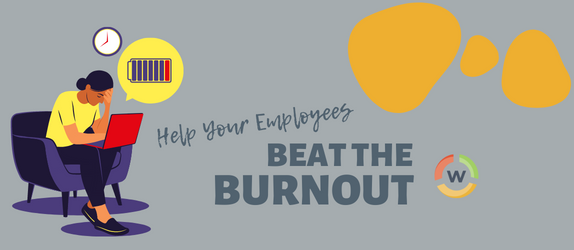The Burn Ointment: Creating a Sense of Belonging as a Solution

by Dr. Denise L. Caleb and Dr. Beth Kaplan
Throughout this summer series, the goal is to Beat the Burnout. You have learned about how the slow development of “quiet quitting” can push women into silence without support, leading to scar tissue and resulting in “third-degree burns.” If you have remained with us through the month of July to part three, you will receive what we call the “ointment” or potential recommendations to alleviate burnout by leveraging belonging as a solution.
When you read this series and the amount of candor that has been shared, there should be no surprise as to why women are quitting quietly and sometimes in a loud manner. The time is now to infuse Diversity, Equity, Inclusion, and Belonging (DEIB) throughout your organization, to prevent burnout and create a full sense of belonging. I met Dr. Beth Kaplan over a year ago and was impressed by her research. She provides us a new way to understand “belonging.” This current crisis, and yes, I am calling it a crisis. A crisis women face each day in the workplace, as they try to do “all” can be resolved by understanding and embracing “belonging.”
Belonging = the needed ointment to prevent the burn
“Belonging” is the innate human feeling to be a part of something larger than ourselves — without sacrificing who we are. When we feel stuck and burned out, we impose expectations on ourselves that cause a threat to who we are and our sense of belonging. Sacrificing who we are can be an unfortunate side effect and becomes a real danger when we are faced with toxic workplaces that cause: (a) chronic stress, (b) emotional exhaustion, and (c) a sense of detachment or cynicism in us.

When individuals feel disconnected or isolated, they are more susceptible to experiencing burnout. “Belonging” can be a solution for burnout. It addresses one of the core underlying factors contributing to burnout — lack of social support and connection.
As an eight-time career executive, I had a moment on an executive team, when I was in a meeting, and I paused in my tracks. I looked around the room and thought to myself, I really don’t belong here. Nor do I belong with the leaders who are around the table. The ironic component of this self-revolution is that I was in a position of power, autonomy, and I was being paid well. But I did not feel like I should be there, at that time, on that team. The incongruent alignment I had with others — such as the lack of lived experiences — left me devoid of a sense of “belonging.” I was on the verge of burnout. I was longing for feelings of safety, togetherness, and support. Qualities my executive team was certainly lacking.
Connectedness as belonging
Community and camaraderie provide us with emotional support, empathy, and understanding. Finding a place where we can be ourselves as opposed to “fitting in” — which leads to belonging uncertainty — does wonders for our well-being and sense of self and often gives us the perspectives we need. The support of the community we choose can help us cope with stress, manage workloads, and navigate challenges more effectively. Feeling connected to a community (or, in the workplace, a supportive team) helps combat the isolation often accompanying burnout.
Interacting with others, engaging in shared activities, and fostering meaningful relationships can counteract the feelings of loneliness and disconnection that contribute to burnout. “Belonging” to a supportive community can enhance resilience, which is the ability to bounce back from adversity. When individuals face challenging situations, having a sense of “belonging” can provide them with a source of strength, encouragement, and motivation to persist.
When I think of a completely different executive experience, with a different organization, team and set of leaders I experienced a wonderful sense of community. I felt like myself and that I could be authentic. I was not afraid to share information about my family, my husband’s deployments — it felt comfortable, safe, supportive, and I really felt a sense of home. I often frame our DEIB Integration work in the context of purpose. It is important to understand self and your individual purpose and how that either aligns with the mission, vision, and values of the organization, or how it does not. When there is alignment, a vast sense of “belonging” materializes.
Aligning self to purpose
“Belonging” to a group, a team, or a company with a shared purpose can provide individuals with a sense of meaning and fulfillment. When individuals feel their work aligns with their values and contributes to a larger goal, they are more likely to experience satisfaction and fulfillment, reducing the risk of burnout. “Belonging” to a group also provides human connection. Connection provides individuals with emotional support from others. When facing stress, challenges, or feelings of burnout, having someone to talk to, share experiences with, and receive empathy from can be incredibly beneficial. Emotional support helps individuals feel understood, validated, and less alone in their struggles, reducing the emotional toll of burnout.
Often times when consulting, I talk about an individual’s purpose being aligned to the organization’s purpose. When this alignment happens, a human connection emerges, and a sense of peace comes into play. If organizations really want to show up for women at the executive level — create sense of belonging that is untouchable. The design of the employee experience is a key component to preventing burnout and “quiet quitting.”
Connection and social support have been shown to reduce stress levels. Engaging in positive social interactions triggers the release of hormones like oxytocin, which can help lower cortisol levels (the stress hormone). This can lead to improved emotional well-being and resilience in the face of stress, making individuals less susceptible to burnout. Connection allows individuals to learn and develop healthy coping mechanisms. By observing and interacting with others, people can gain insights into different strategies for managing stress, balancing work and personal life, and maintaining well-being.
Without belonging, physical wellbeing can suffer
Sharing experiences and receiving advice from others who have faced similar challenges can provide individuals with valuable tools to cope with burnout. Connection provides an opportunity to gain perspective and validation. Engaging with others who may have experienced similar burnout-related struggles can help individuals understand their feelings and experiences are valid and shared by others. This validation can alleviate the self-doubt and self-blame often associated with burnout and promote a sense of normalcy and acceptance.
The lowering of cortisol is often discussed in the realm of sleep or exercise. When we think about how well-being programs can thrive, consider focusing on how “belonging” can assist with not only connections, but how women physically feel and navigate the work environment based on the elevation of wellness. If nothing else is taken away from our “Beat the Burnout” series, know that there are real physical outcomes when the ointment of “belonging” is applied and integrated throughout an entire organization.
For women in executive roles, and for all employees — Belonging Matters!
While belonging can be a powerful solution for burnout, it may not address all the underlying causes or individual circumstances contributing to burnout. Other strategies, such as self-care, setting boundaries, and addressing organizational factors, may also be necessary to effectively prevent and manage burnout. Coupling these strategies with an understanding of our own sense of belonging is a strong way to reduce burnout and thrive.
Thank you for joining us this July to “Beat the Burn Out.” We hope this three-part blog series provided thought leadership, insights, and the understanding of some key factors to assist with “quiet quitting,” the “third-degree burns” women face, and the ointment solution of “belonging.” If you missed any of the prior segments, ensure you go back to read the full series in its entirety.
We want women at work to feel supported and heard. We desperately need to “Beat the Burn Out” and allow women to gain the benefits of “belonging.”
ABOUT THE AUTHORS

Dr. Denise Caleb, M.Ed., CME, SHRM-CP, PHR, is the First Vice President and Director of the Human Capital Consulting Practice, where she leads the Human Resources (HR), Organizational Development (OD), Diversity, Equity, Inclusion, and Belonging (DEIB) Strategy, and Creative Service lines of business.
As one of the leading experts in the country on DEIB, holding a CHRO position twice, spending more than 25 years in human resources, business development, and executive leadership roles, and a military spouse of 27 years, Dr. Caleb is focused on innovating and leading the Human Capital strategies and expanding the service lines to enhance FutureSense’s DEIB capabilities.

Dr. Beth Kaplan is a catalyst for change in belonging and leadership development. She is a researcher, speaker, and thought leader who helps individuals and business leaders unleash their mind’s potential and overcome obstacles. Dr. Kaplan draws on her studies in human connection, learning and leadership development, and post-traumatic growth, as well as her personal journey of triumph over adversity. With her captivating storytelling and expertise in translating complex concepts, she empowers individuals and organizations to unleash their true potential. Recognized by prestigious organizations and publications, Dr. Kaplan stands as a beacon of transformation and inspiration on all things belonging. She has an MSE.d and ED.D in Learning and Leadership Strategy from The University of Pennsylvania.
Share this article:
Other Articles
